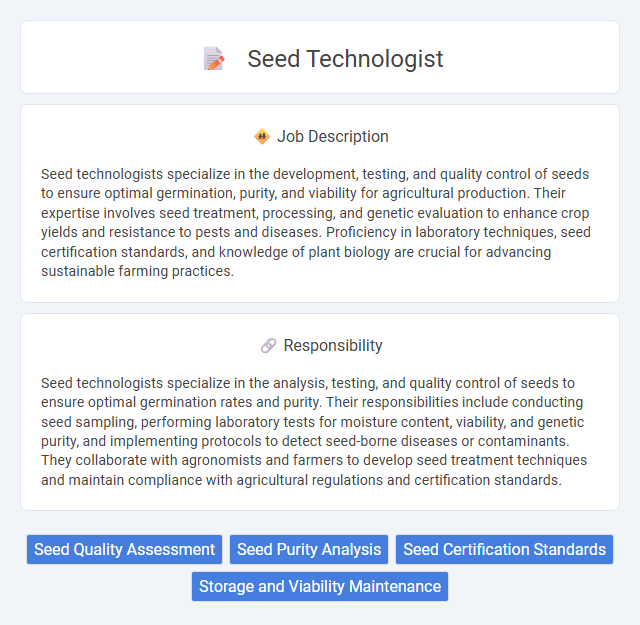
Seed technologists specialize in the development, testing, and quality control of seeds to ensure optimal germination, purity, and viability for agricultural production. Their expertise involves seed treatment, processing, and genetic evaluation to enhance crop yields and resistance to pests and diseases. Proficiency in laboratory techniques, seed certification standards, and knowledge of plant biology are crucial for advancing sustainable farming practices.
Individuals with strong analytical skills and attention to detail are likely to thrive as seed technologists, given the precision required in seed testing and quality control. Those comfortable working in laboratory settings and handling repetitive tasks might find this role suitable, as it often involves meticulous examination of seed samples. However, candidates who prefer dynamic or less technical environments may find the job less fitting for their interests and strengths.
Qualification
A Seed Technologist typically holds a bachelor's degree in agricultural science, plant biology, or a related field, with advanced training in seed physiology and genetics preferred. Certification from recognized bodies such as the Society of Commercial Seed Technologists (SCST) enhances professional credibility and expertise in seed testing and quality control. Proficiency in laboratory techniques, seed treatment processes, and regulatory compliance is essential for ensuring seed viability and supporting agricultural productivity.
Responsibility
Seed technologists specialize in the analysis, testing, and quality control of seeds to ensure optimal germination rates and purity. Their responsibilities include conducting seed sampling, performing laboratory tests for moisture content, viability, and genetic purity, and implementing protocols to detect seed-borne diseases or contaminants. They collaborate with agronomists and farmers to develop seed treatment techniques and maintain compliance with agricultural regulations and certification standards.
Benefit
Working as a seed technologist likely offers benefits such as contributing to agricultural innovation and improving crop yields. The role probably provides opportunities for hands-on research with cutting-edge seed treatments and quality control techniques. Career prospects may include collaboration with agronomists and participation in sustainable farming projects.
Challenge
A Seed Technologist likely faces the challenge of ensuring seed quality and viability while adapting to evolving agricultural standards and environmental conditions. They may need to analyze genetic traits and optimize seed treatments under tight regulatory constraints. Balancing innovation with sustainability could present ongoing complexities in this role.
Career Advancement
Seed technologists play a crucial role in enhancing crop quality through genetic research and seed testing, providing opportunities for specialization in biotechnology and agronomy. Career advancement often involves progressing to senior research positions, quality control management, or roles in regulatory affairs within seed production companies. Continuous education and certification in plant genetics and seed science significantly boost prospects for leadership roles in agricultural technology firms.
Key Terms
Seed Quality Assessment
Seed technologists specialize in seed quality assessment by conducting rigorous testing to ensure seed viability, purity, and germination rates meet industry standards. They utilize advanced laboratory techniques and equipment to monitor seed moisture content, genetic integrity, and the presence of contaminants or diseases. Their expertise is crucial for improving crop yields and supporting sustainable agricultural practices through certified seed production.
Seed Purity Analysis
Seed purity analysis involves identifying and quantifying the proportion of pure seed in a sample, ensuring compliance with agricultural standards and enhancing crop quality. A seed technologist uses laboratory techniques such as flotation, sieving, and microscopy to detect contaminants like weed seeds, inert matter, and other crop seeds. Accurate seed purity results support certification processes, improve germination rates, and contribute to sustainable seed production practices.
Seed Certification Standards
Seed technologists specialize in ensuring seed quality by adhering to strict Seed Certification Standards, which encompass testing for genetic purity, germination rates, and seed health. They implement protocols aligned with national and international certification agencies such as ISTA and the OECD Seed Schemes to guarantee compliance. Their expertise supports agricultural productivity by maintaining the integrity and performance of certified seed varieties.
Storage and Viability Maintenance
Seed technologists specialize in optimizing storage conditions to preserve seed viability for extended periods, ensuring high germination rates. They employ controlled temperature, humidity, and packaging techniques to prevent deterioration and fungal contamination during storage. Regular viability testing and monitoring enable timely regeneration or replacement of seed stocks to maintain genetic integrity and crop productivity.
 kuljobs.com
kuljobs.com